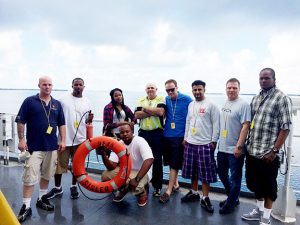In our highly politicized world, it has become a rarity for Members of Congress to agree on anything. So when a large group of bipartisan lawmakers comes together to take a stand on a single issue, it’s probably a good idea to listen.
One of these rare moments happened earlier this week when 66 lawmakers, led by Reps. Duncan Hunter (R-CA), John Garamendi (D-CA), David Joyce (R-OH) and Cedric Richmond (D-LA) stood up for good jobs, a strong U.S. maritime industry, and national security by supporting strong cargo preference — or “Ship American” — laws.
By requiring government agencies to ship cargo on U.S. flagged, owned, and crewed vessels, Ship American laws play an important role in keeping the United States safe and its economy strong. That’s because every day, highly trained, highly skilled civilian mariners transport cargo and passengers, and stand ready to meet the military sealift needs of our nation. They facilitate the delivery of foreign aid, provide a waterborne response for domestic and international disaster recovery missions, and, in times of war, transport military personnel and cargoes.
Without civilian mariners, America would be forced to turn these responsibilities over to foreign flagged, foreign-crewed vessels, owned and operated by those who may not share our interests. And without strong cargo preference laws, American mariners would lose good, middle-class jobs to unfair foreign competition.
Yet, under the guise of keeping transportation costs low, some government agencies have, for years, been skirting strict cargo preference laws, instead choosing to ship government cargo on foreign vessels. At a time when government budgets are strapped and cost cutting is akin to an Olympic sport, this may seem like a viable solution — but there’s a problem: The true costs of shipping government-impelled cargo boil down to more than just dollars and cents.
For starters, the cost savings agencies earn from using foreign vessels to ship government cargo is minimal at best, and avoiding these laws means taxpayer dollars are being used to support foreign shipping services. Moreover, this practice ignores the very real reason Congress implemented Ship American laws in the first place. The same crews that carry government cargo are the same men and women who stand ready to move U.S. military and humanitarian cargo as needed. In other words, retaining a pool of highly trained, qualified, and loyal mariners who can meet the military and humanitarian needs of our country is contingent upon government agencies abiding by strong cargo preference laws.
The failure to do so is contributing to a significant strain on the strength and readiness of America’s civilian mariners. At present, the merchant marine is 2,000 mariners and five ships short of the minimum requirements needed to support our country’s sealift capabilities. Since 2010, more than 900 U.S. mariners have left the industry and, if things don’t change, more are expected to choose this path.
The pool of highly skilled, highly qualified civilian mariners needed to meet this country’s tactical objectives isn’t created out of thin air. It is built and sustained through smart, strategic policies that have strong bipartisan support — including strict cargo preference laws.
The alarm bells have been rung. Ignoring the distress signals could spell disaster for America’s maritime industry, the good jobs it supports, and jeopardize our national security. It is now up to our executive branch to heed the advice of lawmakers and take action by enforcing common-sense Ship American laws.
